Question Number 107745 by ajfour last updated on 12/Aug/20
![(i) L=lim_(x→0) [(((1+x)^(1/x) )/e)]^(1/x) = ? (ii) L=lim_(x→∞) [(x/e)−x((x/(x+1)))^x ] = ?](https://www.tinkutara.com/question/Q107745.png)
$$\left({i}\right)\:\:\:{L}=\underset{{x}\rightarrow\mathrm{0}} {\mathrm{lim}}\left[\frac{\left(\mathrm{1}+{x}\right)^{\mathrm{1}/{x}} }{{e}}\right]^{\mathrm{1}/{x}} \:\:=\:? \\ $$$$\left({ii}\right)\:\:{L}=\underset{{x}\rightarrow\infty} {\mathrm{lim}}\left[\frac{{x}}{{e}}−{x}\left(\frac{{x}}{{x}+\mathrm{1}}\right)^{{x}} \right]\:=\:? \\ $$
Commented by ajfour last updated on 12/Aug/20

$${MJS}\:{Sir},\:{please}\:{help}.. \\ $$
Commented by bemath last updated on 13/Aug/20
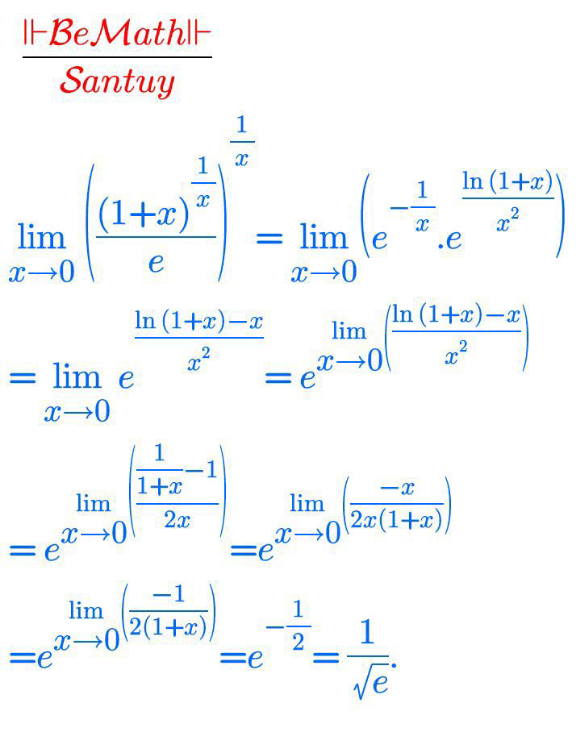
Commented by bobhans last updated on 13/Aug/20

$$\mathrm{wow}..==\mathrm{great}\:\mathrm{and}\:\mathrm{nice} \\ $$
Answered by Dwaipayan Shikari last updated on 13/Aug/20
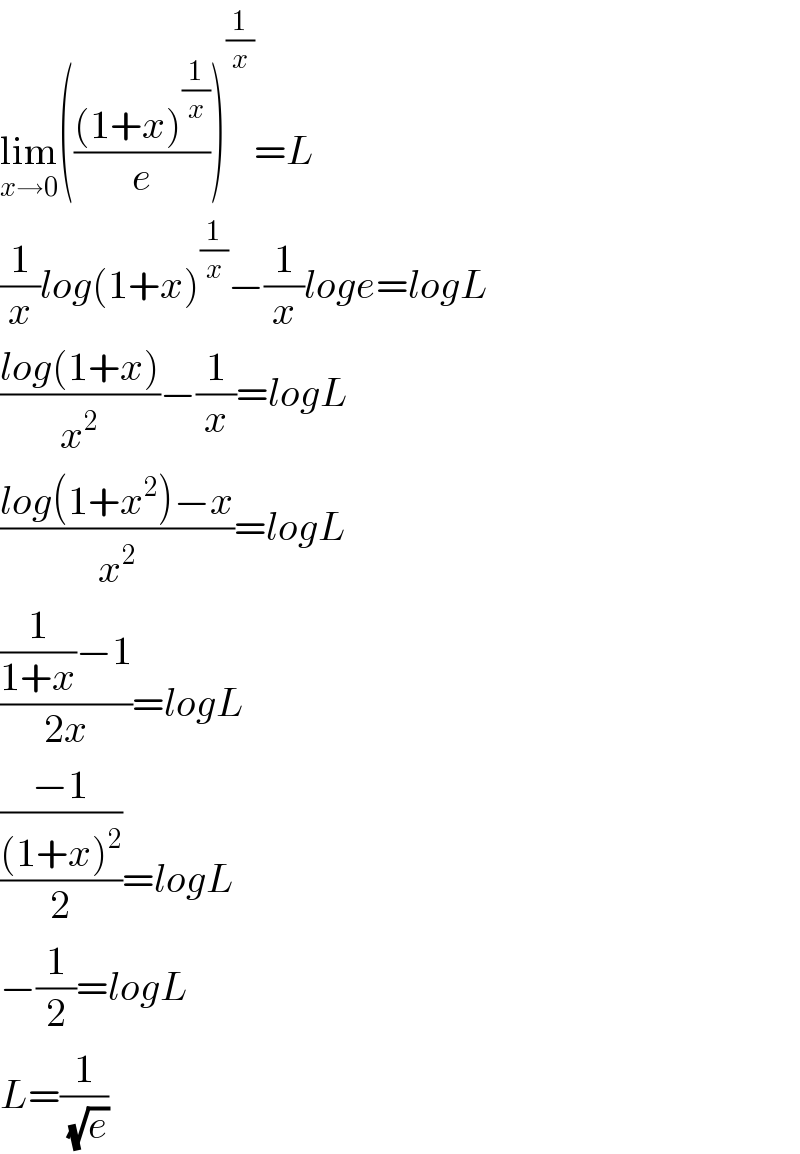
$$\underset{{x}\rightarrow\mathrm{0}} {\mathrm{lim}}\left(\frac{\left(\mathrm{1}+{x}\right)^{\frac{\mathrm{1}}{{x}}} }{{e}}\right)^{\frac{\mathrm{1}}{{x}}} ={L} \\ $$$$\frac{\mathrm{1}}{{x}}{log}\left(\mathrm{1}+{x}\right)^{\frac{\mathrm{1}}{{x}}} −\frac{\mathrm{1}}{{x}}{loge}={logL} \\ $$$$\frac{{log}\left(\mathrm{1}+{x}\right)}{{x}^{\mathrm{2}} }−\frac{\mathrm{1}}{{x}}={logL} \\ $$$$\frac{{log}\left(\mathrm{1}+{x}^{\mathrm{2}} \right)−{x}}{{x}^{\mathrm{2}} }={logL} \\ $$$$\frac{\frac{\mathrm{1}}{\mathrm{1}+{x}}−\mathrm{1}}{\mathrm{2}{x}}={logL} \\ $$$$\frac{\frac{−\mathrm{1}}{\left(\mathrm{1}+{x}\right)^{\mathrm{2}} }}{\mathrm{2}}={logL} \\ $$$$−\frac{\mathrm{1}}{\mathrm{2}}={logL} \\ $$$${L}=\frac{\mathrm{1}}{\:\sqrt{{e}}} \\ $$
Commented by ajfour last updated on 12/Aug/20

$${Great}!\:\:\:{thanks}\:{a}\:{lot}. \\ $$
Commented by Dwaipayan Shikari last updated on 12/Aug/20
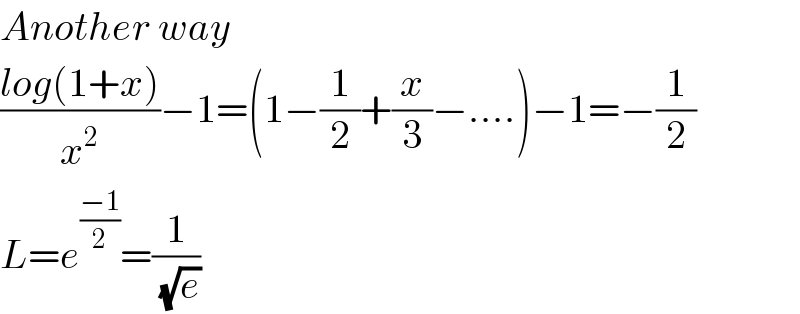
$${Another}\:{way} \\ $$$$\frac{{log}\left(\mathrm{1}+{x}\right)}{{x}^{\mathrm{2}} }−\mathrm{1}=\left(\mathrm{1}−\frac{\mathrm{1}}{\mathrm{2}}+\frac{{x}}{\mathrm{3}}−….\right)−\mathrm{1}=−\frac{\mathrm{1}}{\mathrm{2}} \\ $$$${L}={e}^{\frac{−\mathrm{1}}{\mathrm{2}}} =\frac{\mathrm{1}}{\:\sqrt{{e}}} \\ $$
Commented by bemath last updated on 13/Aug/20
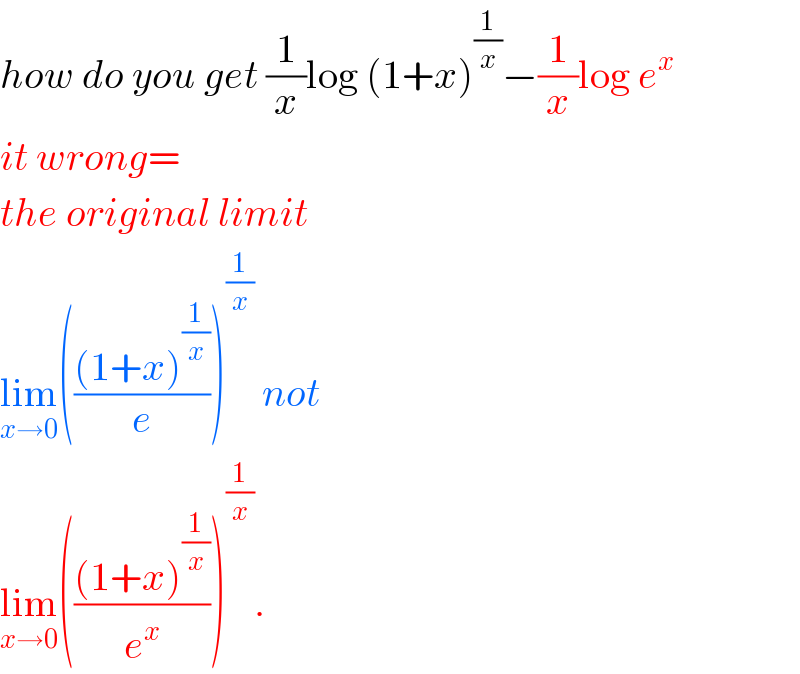
$${how}\:{do}\:{you}\:{get}\:\frac{\mathrm{1}}{{x}}\mathrm{log}\:\left(\mathrm{1}+{x}\right)^{\frac{\mathrm{1}}{{x}}} −\frac{\mathrm{1}}{{x}}\mathrm{log}\:{e}^{{x}} \\ $$$${it}\:{wrong}= \\ $$$${the}\:{original}\:{limit}\: \\ $$$$\underset{{x}\rightarrow\mathrm{0}} {\mathrm{lim}}\left(\frac{\left(\mathrm{1}+{x}\right)^{\frac{\mathrm{1}}{{x}}} }{{e}}\right)^{\frac{\mathrm{1}}{{x}}} \:{not}\: \\ $$$$\underset{{x}\rightarrow\mathrm{0}} {\mathrm{lim}}\left(\frac{\left(\mathrm{1}+{x}\right)^{\frac{\mathrm{1}}{{x}}} }{{e}^{{x}} }\right)^{\frac{\mathrm{1}}{{x}}} . \\ $$
Answered by mathmax by abdo last updated on 12/Aug/20
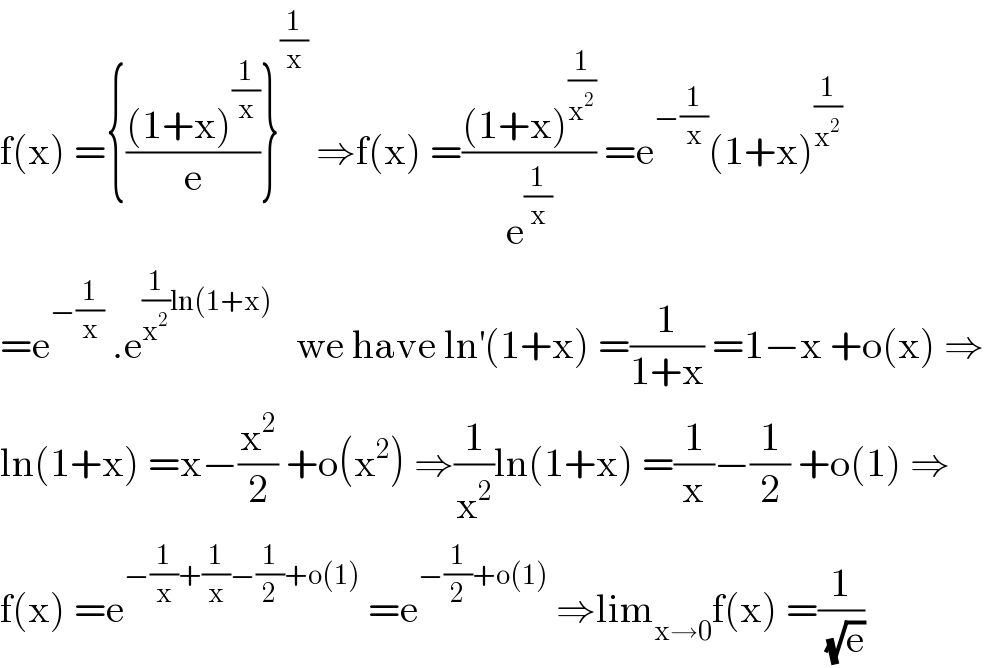
$$\mathrm{f}\left(\mathrm{x}\right)\:=\left\{\frac{\left(\mathrm{1}+\mathrm{x}\right)^{\frac{\mathrm{1}}{\mathrm{x}}} }{\mathrm{e}}\right\}^{\frac{\mathrm{1}}{\mathrm{x}}} \:\Rightarrow\mathrm{f}\left(\mathrm{x}\right)\:=\frac{\left(\mathrm{1}+\mathrm{x}\right)^{\frac{\mathrm{1}}{\mathrm{x}^{\mathrm{2}} }} }{\mathrm{e}^{\frac{\mathrm{1}}{\mathrm{x}}} }\:=\mathrm{e}^{−\frac{\mathrm{1}}{\mathrm{x}}} \left(\mathrm{1}+\mathrm{x}\right)^{\frac{\mathrm{1}}{\mathrm{x}^{\mathrm{2}} }} \\ $$$$=\mathrm{e}^{−\frac{\mathrm{1}}{\mathrm{x}}} \:.\mathrm{e}^{\frac{\mathrm{1}}{\mathrm{x}^{\mathrm{2}} }\mathrm{ln}\left(\mathrm{1}+\mathrm{x}\right)} \:\:\:\mathrm{we}\:\mathrm{have}\:\mathrm{ln}^{'} \left(\mathrm{1}+\mathrm{x}\right)\:=\frac{\mathrm{1}}{\mathrm{1}+\mathrm{x}}\:=\mathrm{1}−\mathrm{x}\:+\mathrm{o}\left(\mathrm{x}\right)\:\Rightarrow \\ $$$$\mathrm{ln}\left(\mathrm{1}+\mathrm{x}\right)\:=\mathrm{x}−\frac{\mathrm{x}^{\mathrm{2}} }{\mathrm{2}}\:+\mathrm{o}\left(\mathrm{x}^{\mathrm{2}} \right)\:\Rightarrow\frac{\mathrm{1}}{\mathrm{x}^{\mathrm{2}} }\mathrm{ln}\left(\mathrm{1}+\mathrm{x}\right)\:=\frac{\mathrm{1}}{\mathrm{x}}−\frac{\mathrm{1}}{\mathrm{2}}\:+\mathrm{o}\left(\mathrm{1}\right)\:\Rightarrow \\ $$$$\mathrm{f}\left(\mathrm{x}\right)\:=\mathrm{e}^{−\frac{\mathrm{1}}{\mathrm{x}}+\frac{\mathrm{1}}{\mathrm{x}}−\frac{\mathrm{1}}{\mathrm{2}}+\mathrm{o}\left(\mathrm{1}\right)} \:=\mathrm{e}^{−\frac{\mathrm{1}}{\mathrm{2}}+\mathrm{o}\left(\mathrm{1}\right)} \:\Rightarrow\mathrm{lim}_{\mathrm{x}\rightarrow\mathrm{0}} \mathrm{f}\left(\mathrm{x}\right)\:=\frac{\mathrm{1}}{\:\sqrt{\mathrm{e}}} \\ $$
